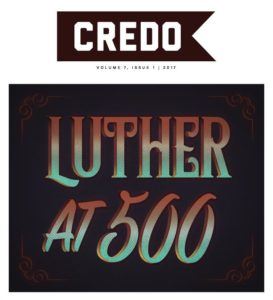
Recently I entered the men’s room at our seminary and discovered that someone had left a box of packages, wrapped in brown paper, marked “For astudent.” One parcel had someone’s name on it, so, thinking that that person had left their box on the shelf, I went on without
disturbing things. Several days later, another colleague retrieved the box that had been left, seemingly abandoned. He opened one of the packages to discover that each parcel contained a pair of books—Absolutely Free (reprint ed.) by Zane Hodges and The Ten Most Misunderstood Words in the Bible by Robert Wilkin. It seems that someone surreptitiously deposited said box in the men’s room thinking that some of our students would rightly assume the packages were for them and help themselves. Upon discussing the situation with the administration, it seems that someone (likely the same person) also left copies of the magazine of the Grace Theological Society at strategic spots around the campus and hung small posters in the men’s room promoting the Free Grace movement. These had been removed by the time I spotted the books.
At Central, we are always glad to pass on free books to our students, even books that contain error. Students should read widely and examine for themselves the issues against the Scriptures. As a matter of fact, none of us on the faculty espouse a Free Grace position, but no matter, we’d have gladly seen to it that the books went to where they were intended, though it would have been nice to have been asked before the literature was disseminated.
Now, I tell this story as it juxtaposes with a new book that I read recently on Free Grace theology. I had already agreed to review it for Credo when the secretive “free gracer” struck. It seems that the Free Grace movement is alive and well, at least in our area. For this reason, I am happy to have discovered Grudem’s helpful summary of Free Grace problems: “Free Grace” Theology: Five Ways It Diminishes the Gospel (Wheaton, IL: Crossway, 2016).
Grudem’s book is a small work of less than 150 pages. It provides limited historical development of the Free Grace movement and there is really minimal interaction with the literature of the movement as a whole. This is not to suggest Grudem doesn’t get it right. Au contare, the relatively few works that Grudem interacts with are from main purveyors of this theology—Zane Hodges, Charles Bing, Joseph Dillow, Bob Wilkin and Dave Anderson; Dallas men everyone. A history of the movement might well be titled, Dallas Against the World, although as Grudem recognizes, it was a minority view even there.
As such, Grudem’s book is not a full-throated engagement with Free Grace theology. Nor is it an interaction with the Lordship salvation debate directly as Grudem feels that the terminology here is misleading. Instead, he prefers to call his view the “historic Protestant” view and focuses his attention on five key deficiencies of Free Grace theology. His tone is irenic and he assures his readership of his appreciation for the Free Grace proponents as Christian brothers despite their faulty theology.
First, Free Grace writers misunderstand the Reformation principle of sola fide—justification by faith alone. Free Grace is akin to old Sandemanianism—“the bare belief of the bare truth,” with no thought about attending evidences. This leads to Grudem’s second concern—Free Grace’s rejection of the need of repentance as a condition for salvation. In Grudem’s mind, this rejection of repentance produces not a false gospel but a weak gospel (74). It is not a false gospel as people who hear the Free Grace offer do savingly believe and some actually do repent in their hearts to some extent, even if they fail to realize this is what they are doing.
But lack of repentance is a major problem for many as it leads to Grudem’s third major issue with Free Grace theology—a false assurance. A salvation lacking repentance is no salvation at all and any assurance offered is false if no repentance preceded it. Since it is the case that some may have professed faith without repentance, “they are still lacking in a component of genuine saving faith” (78). In other words, they are still lost. At the end of the book, Grudem pleads with some who may have this false assurance to savingly repent and believe.
Fourth, the Free Grace theology fails to fully appreciate the person and work of Christ. “Mental agreement with facts about Christ without personal trust in Christ is not saving faith” (107). In arguing this section, Grudem relies heavily on the thought of B. B. Warfield.
The final section is given to discussing some strained interpretative decisions that Free Grace proponents are forced to make to sustain their view. In twenty pages, Grudem summarizes the principle teachings of Free Grace regarding eleven key texts such as James 2:14-17 and James 2:26. “Faith ‘without works’ is exactly the kind that indicates that a person is not genuinely saved” (136). Grudem summarizes the general way in which Free Grace proponents handle the text. In many cases, their interpretation is little more than “special pleading.” Some interpretative choices are so unique so as to fail to be found in any of the “standard commentaries because no serious interpreter in the history [sic] of the church has held these interpretations” (120).
As Grudem concludes his book, he mentions several topics he purposefully avoided. Again, the issue of Lordship is raised and dismissed as are the kinds of faith the New Testament discusses and the issue of the so-called “carnal Christian.” He also omitted a discussion of Reformed vs. Arminian theology, since Free Grace is often at variance with both views. In the end, Wayne Grudem is to be thanked for a brief but helpful summary of the deficiencies of Free Grace theology. His irenic tone should allow for a wide read and hopefully some who have been caught up in this unfortunate error may be persuaded to embrace a more robust understanding of the amazing grace of God.


